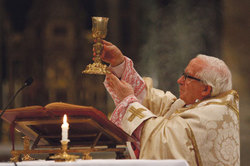Curious to what others think, I was elated to see the connections the Prefect of the Congregation for Divine Worship (Rome), Cardinal Antonio Cañizares Llovera, made with the sacred Liturgy in an interv: evangelization, civilization and freedom. It is not very surprising to me that the Prefect of this particular Vatican office said that the Liturgy is the vehicle for our intellectual and cultural renewal. It is new data for those see the Church’s liturgical life as a method for community organizing and feeling good about themselves. I was surprised however, that the Cardinal indicated that the Pope is in favor of Sacrosanctum Concilium. Not that the Pope is radically in disfavor of it but that the Pope’s committed to the document. With all that document’s flaws and the misinterpretations, this is something for me to chew on. May be the Pope is right in that we have to re-evaluate our interpretation of SC. Since 2013 is the 50th anniversary of SC, I am hoping for a brilliant liturgical letter from the Pope. Ultimately, the point is, do we really know what the sacred Liturgy is and how it is a path unto our eternal destiny? Do we really understand that the Liturgy, not our ideology, sets bar for our interior conversion?
Here are some excerpts of the Cardinal’s interview:
“To evangelise the culture means having one’s gaze
fixed on Christ because a man who accepts Christ – who is truly man – will have
Christ’s mentality, thoughts, and feelings,” he said.
“[To build] a civilisation of love, as John Paul II and
Benedict XVI have called for, seems to be a work of evangelisation because in
such a society, God really is recognized as God. The problem of our times is a
culture built without God.”
When it comes to re-evangelising the West in general he [the Cardinal] pointed to the example of St Benedict of Norcia and his search for God and
imitation of Christ. But changing the mentality, he said, includes measures
such as “renewing the liturgy”, reintroducing a “correct sense
of freedom” and presenting “a true and stronger” sense of
religiosity.
Being of similar mind to Benedict XVI he [the Cardinal] naturally has the
same approach to the liturgy which he sees not only as important for the
Church, but also for the world at large.
“Benedict XVI reminds us that the first document of the
Second Vatican Council was Sacrosanctum Concilium [the Constitution on the
Sacred Liturgy], and the last document was Gaudium et Spes, [the Pastoral
Constitution on the Church in the Modern World].” he said.
“If we want to be present as Christians in the world,
to form and renew the world, to bring peace, freedom et cetera, we cannot do
that without leaning on the liturgy, on Sacrosanctum Concilium. For this
reason, the Holy Father is very committed to renew the liturgy, to recover
Sacrosanctum Concilium.”
“The liturgy is the first banquet of God; it’s where we can
identify God, it’s prayer, it’s where we can discover salvation, the work of
Grace – all of which are God’s initiative,” he said. “When this is
lived, when it is at the centre of one’s life, the heart changes, the mentality
changes, and also society.”
~Taken from Edward Pentin’s Catholic Herald article of April 16, 2010.
